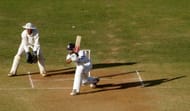
Elegant in attack and elaborate in defence
When Rahul Dravid went down one on his left knee and drove a cricket ball through the covers, as he often did during his first innings chef-d’oeuvre at the Adelaide Oval in 2003, one could forget all of life’s worries for a while. When he defended it, as he obdurately did across two match-winning masterclasses on a Sabina Park minefield in 2006, one could see that he was bringing all of his experience and skill to bear on not letting the red blob slip through. Elegant in attack and elaborate in defence, Dravid’s batsmanship, according to the historian and cricket aficionado Mukul Kesavan, was a unique specimen; a fusion of Sunil Gavaskar’s temperament and Gundappa Viswanath’s technique.
For all that, however, Dravid attracts (if ‘attracts’ is the word) more clichés than most cricketers, perhaps because they do not seem to affect him one way or another. The metaphor that compares him with constructed structures is, for example, so popular that, somewhere inside the Chinnaswamy Stadium in Bangalore, you will find one with 10000 bricks, commemorating his 2008 entry into the club of batsmen with 10000 Test runs! Close at the heels of that metaphor are other expressions such as ‘perfect team man’, ‘thorough gentleman’, ‘thinking cricketer’, ‘serious individual’ and ‘a great servant of the game’. There can be little doubt that the mentioned descriptions of Dravid are well-meaning and say something of the man. By painting him in terms of idealistic generalities rather than from reality, however, they inadvertently do him a disservice.
The reality is that Dravid was a great Test batsman, a predominantly defensive one, yes, but not perversely so. He once made 177 in a day against Sri Lanka after the first four batsmen were back in the hut for 30-odd and during his last Test match on English soil, contributed nearly half of his team’s runs at the Oval (where he had been jeered at four years earlier, while cussedly crawling to 12 runs off 16 overs, with the noble object of salvaging a rare series lead on foreign terrain) at a fair click.

As an ODI player, Dravid had his moments, especially in the 1999 World Cup in England where he topped the run charts with 461 runs; and in the early and middle 2000s, when he played the role of a finisher with panache, even whilst he kept wickets, scoring crucial half-centuries, including a rapid one off 22 balls against New Zealand. As a captain, Dravid was tough, occasionally ruthless, which is why India's first round exit at the 2007 World Cup hurt him as much as the Test series victories in the West Indies and England thrilled him. In an interesting appendix to his international career, Dravid also played a solitary T20 in Indian flannels, during which he lofted Samit Patel for three consecutive sixes!
Eloquent and equable
The reality is that Dravid is an eloquent (if measured) speaker, who is capable of flavouring his considered talks on cricket with a humorous anecdote here and a nugget of history there, as testified by his Bradman Oration in 2011 and his MAK Pataudi memorial lecture in 2015. He would naturally have been a respected voice ‘on air’, but defying type again, Dravid returned to the field, just after a few stints in air-conditioned commentary boxes, this time to coach the India A and India Under 19 teams, because this was the level from where the careers of young Indian cricketers, he felt, could be shaped. Moreover, when allegations of conflict of interest emerged, vis-à-vis his roles in the national set-up and his role as a mentor at Delhi Daredevils, Dravid forwent the latter, arguably more glamorous, role. Like his idol Steve Waugh, Dravid has seldom taken the easier route and his legacy burns brighter because of that.

The reality is also that the recent victory of the Indian boys at the Under-19 World Cup adds another glorious chapter to Dravid’s career in cricket. Dravid, however, was the first to admit that this was not about him (as a coach), let alone about his not winning a World Cup (as a player). He is clear that Under-19 cricket is no more than a formative school for young cricketers, and urges his wards to give importance to the country’s first-class cricket, which is the launch pad from where many Indian greats, including Dravid himself, have made it to the national team. He wholeheartedly shares his success as a coach with all his support staff and, free from the trappings of his past achievements, calls for equal rewards to be given to everyone who helped in the World Cup win.
Not long ago, Dravid politely declined an honorary doctorate, indicating that he would prefer to earn something like it by accomplishing some form of academic research in sport. Now, that offers a glimpse of Dravid, the individual: there is very little if anything of a celebrity about him, and that is not a cliché. The temptation, therefore, is to cast him as a role model, which is a cliché, and this writer has often found it difficult to resist it. He understands now, however, that Dravid’s story in the annals of Indian cricket is magnificent such as it is, and does not need the seasoning of buzzwords and catchphrases to be read and appreciated.
Follow IPL Auction 2025 Live Updates, News & Biddings at Sportskeeda. Get the fastest updates on Mega-Auction and cricket news
